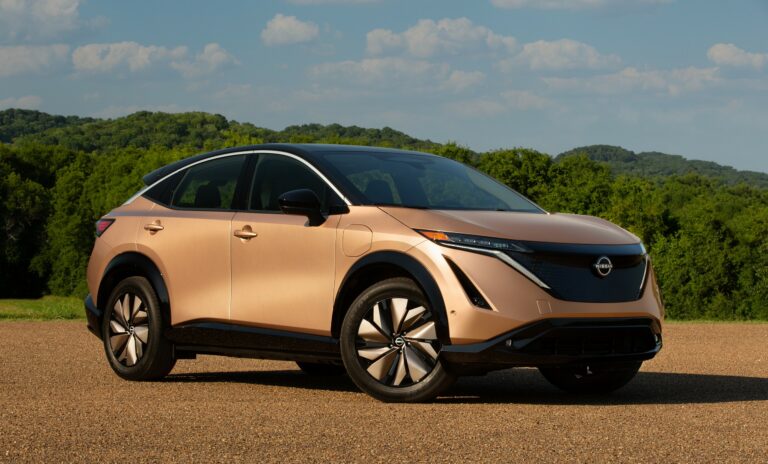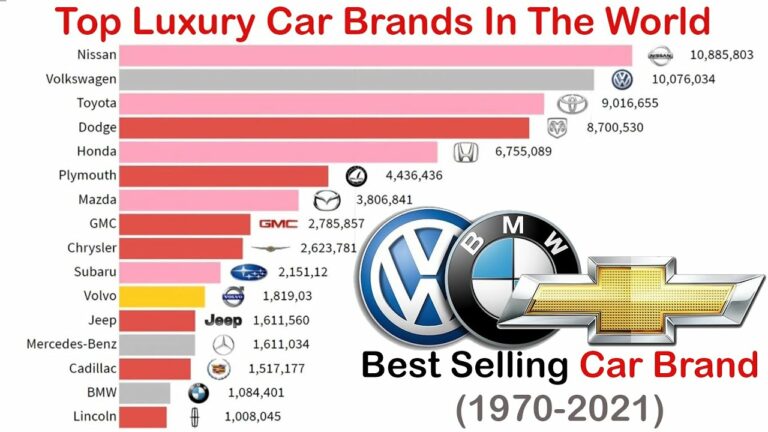Sports Car Brands List: A Comprehensive Guide to Automotive Passion
Sports Car Brands List: A Comprehensive Guide to Automotive Passion cars.truckstrend.com
The roar of an engine, the sleek lines of aerodynamic design, the thrill of blistering acceleration – these are the hallmarks of a sports car. More than just vehicles, sports cars are embodiments of engineering prowess, artistic vision, and unadulterated driving passion. They represent the pinnacle of automotive performance, offering an unparalleled connection between driver and machine. For enthusiasts and aspiring owners alike, understanding the diverse landscape of sports car brands is key to appreciating this unique segment of the automotive world. This comprehensive guide delves into the esteemed list of sports car brands, exploring their heritage, iconic models, and what sets them apart in the pursuit of speed, precision, and driving exhilaration.
The Anatomy of a Sports Car Brand: More Than Just Speed
Sports Car Brands List: A Comprehensive Guide to Automotive Passion
What elevates a car manufacturer to the status of a "sports car brand"? It’s a complex alchemy of factors that goes beyond mere horsepower figures. A true sports car brand is defined by its unwavering commitment to:
- Performance: Not just straight-line speed, but also exceptional handling, braking, and overall dynamic capability. This is achieved through advanced engine technology, lightweight materials, sophisticated suspension systems, and aerodynamic efficiency.
- Driver Engagement: The car must communicate intimately with the driver, offering precise steering, responsive pedals, and a chassis that provides clear feedback. The driving experience is paramount.
- Design Philosophy: Sports cars are often sculptural masterpieces, blending aesthetics with functionality. Their designs are instantly recognizable, often reflecting the brand’s heritage and future vision.
- Heritage and Innovation: Many sports car brands boast rich racing histories and a continuous drive for innovation, pushing the boundaries of what’s possible in automotive engineering.
- Exclusivity and Craftsmanship: While not always limited production, sports cars often embody a higher level of craftsmanship, attention to detail, and a sense of bespoke quality that differentiates them from mass-produced vehicles.

While some brands exclusively produce sports cars (e.g., Ferrari, McLaren), others have dedicated high-performance divisions or iconic models that firmly place them on the sports car map (e.g., Mercedes-AMG, BMW M). The distinction lies in their core focus on creating vehicles that prioritize the driving experience above all else.
Iconic Sports Car Brands: A Deep Dive into Automotive Excellence
The world of sports cars is populated by legendary names, each with its own unique character and philosophy. Here’s a look at some of the most prominent sports car brands:
European Exotics & Luxury Performance
- Ferrari (Italy): Perhaps the most iconic sports car brand, Ferrari embodies passion, speed, and exclusivity. Founded by Enzo Ferrari in 1929, its cars are renowned for their high-revving V8 and V12 engines, exquisite styling, and unparalleled racing heritage. Signature models include the 488, F8 Tributo, SF90 Stradale, and the legendary LaFerrari. Owning a Ferrari is often seen as the ultimate automotive statement.
- Lamborghini (Italy): Born from a rivalry with Ferrari, Lamborghini stands for unadulterated drama, aggressive styling, and colossal power. Known for their naturally aspirated V10 and V12 engines, Lamborghinis are often angular, audacious, and command attention. Key models include the Huracán, Aventador, and the groundbreaking Countach and Miura from its past.
- Porsche (Germany): A master of engineering precision and everyday usability, Porsche offers a unique blend of performance and practicality. The 911 is its enduring icon, renowned for its rear-engine layout and continuous evolution. Other notable models include the mid-engine 718 Boxster/Cayman and the hypercar 918 Spyder. Porsche excels in building cars that are thrilling on track yet comfortable enough for daily driving.
- McLaren (UK): A relative newcomer to road cars but with a deep Formula 1 heritage, McLaren focuses on pure, uncompromised performance. Their cars utilize carbon fiber chassis and twin-turbo V8 engines, prioritizing lightweight construction and aerodynamic efficiency. Models like the 720S, Artura, and the ultimate Senna exemplify McLaren’s dedication to track-focused dynamics.
- Aston Martin (UK): Synonymous with elegance, sophistication, and raw power, Aston Martin creates "beautiful brute" sports cars. Known for their handcrafted interiors, grand touring capabilities, and distinctive V8 and V12 engine notes, Aston Martins offer a blend of luxury and performance. The Vantage, DB11, and DBS Superleggera are modern examples of their refined power.
- Audi (Germany): While a broader luxury car manufacturer, Audi’s R8 supercar firmly places it on this list. With its naturally aspirated V10 engine (shared with Lamborghini Huracán) and quattro all-wheel drive, the R8 offers thrilling performance combined with Audi’s signature technological sophistication and user-friendly cabin.
- Mercedes-AMG (Germany): The high-performance arm of Mercedes-Benz, AMG transforms already luxurious vehicles into track-capable machines. The Mercedes-AMG GT is their dedicated sports car, offering a muscular front-engine, rear-wheel-drive layout with powerful V8 engines, aggressive styling, and a visceral driving experience.


American Performance
- Chevrolet Corvette (USA): America’s quintessential sports car, the Corvette has evolved from a simple roadster to a world-class performance machine. Known for its powerful V8 engines, accessible performance, and distinctive design, the Corvette has continuously pushed boundaries, culminating in the mid-engine C8 generation. It offers incredible performance for the price.
- Ford (USA): While the Mustang is often classified as a "pony car," its high-performance variants like the Shelby GT350 and GT500 blur the lines into true sports car territory with their track-focused engineering, powerful V8 engines, and aggressive aerodynamics. The Ford GT supercar is also a testament to Ford’s capability in extreme performance.
- Dodge (USA): Dodge’s Challenger and Charger, particularly in their "Hellcat" and "Demon" guises, are raw, unadulterated muscle cars that deliver sports car-level acceleration and a distinct, powerful presence. While not traditional sports cars in terms of agility, their sheer power and straight-line speed make them significant players.
Japanese Precision & Performance
- Nissan (Japan): The Nissan GT-R, affectionately known as "Godzilla," redefined performance with its advanced all-wheel-drive system, twin-turbo V6 engine, and astonishingly quick lap times. It prioritizes technological prowess and accessible performance. The new Nissan Z also carries on a long heritage of accessible sports car performance.
- Toyota (Japan): The Toyota Supra, particularly its latest iteration developed with BMW, marks Toyota’s strong return to the sports car segment. It offers a powerful inline-six engine, precise handling, and an engaging driving experience, building on a legendary nameplate.
- Honda (Japan): While not currently mass-producing a dedicated sports car, the legendary Honda NSX (Acura NSX in North America) showcased Japanese precision and performance with its mid-engine layout and innovative use of hybrid technology. Its heritage includes the original NSX, known for its everyday usability and F1-derived engineering.
Key Considerations When Exploring Sports Car Brands
Choosing or even just appreciating a sports car brand involves understanding several crucial aspects:
- Performance Metrics: While horsepower and 0-60 mph times are thrilling, also consider handling dynamics (suspension, steering feel, balance), braking performance, and track capabilities.
- Design & Aesthetics: Sports cars are visual statements. Does the brand’s design language resonate with you? Is it timeless, aggressive, elegant?
- Heritage & Brand Ethos: Does the brand’s history of innovation, racing success, or design philosophy align with your values? This contributes significantly to the car’s soul.
- Exclusivity & Rarity: Some brands or specific models are produced in limited numbers, adding to their desirability and potential for appreciation.
- Reliability & Maintenance: Sports cars, especially high-performance exotics, often have specialized maintenance requirements and higher running costs. Researching a brand’s reliability record and service network is crucial.
- Value Retention: Certain brands and models are known to hold their value exceptionally well, or even appreciate over time, making them a potential investment.
- Driving Experience: This is subjective but vital. Does the car feel engaging? Does it provide the feedback you desire? Is the sound intoxicating? Test drives are indispensable.
Navigating the Market: Tips for Aspiring Owners and Enthusiasts
For those dreaming of owning a sports car, or simply wanting to delve deeper, here’s practical advice:
- Define Your Needs: Are you looking for a daily driver, a weekend toy, or a dedicated track machine? This will narrow down your brand and model choices significantly.
- Set a Realistic Budget: Beyond the purchase price, consider insurance (often high for sports cars), fuel costs, specialized maintenance, and potential customization.
- New vs. Used: Buying used can offer significant savings and access to models that might be out of reach new. However, thorough pre-purchase inspections are paramount for used sports cars.
- Test Drives are Non-Negotiable: Pictures and videos don’t convey the feel of a sports car. Drive as many different models as possible to understand their unique characters.
- Research and Community: Join online forums, read reviews from reputable automotive journalists, and connect with owner communities. Their insights can be invaluable.
- Be Aware of Challenges: Sports cars can be impractical (limited cargo space, low ground clearance), expensive to maintain, and challenging to insure. Be prepared for these realities.
- Solutions: Opt for specialized insurance providers, find reputable independent mechanics for servicing (often more cost-effective than dealerships), and consider a "fun car" alongside a more practical daily driver if budget allows.
Sports Car Brands: Representative Models and Price Ranges
Please note: Prices are highly variable based on model year, trim level, options, condition (for used cars), and market demand. These are general representative ranges for new models where applicable, or typical market values for well-known used models.
| Brand | Country | Notable Sports Car Models | Representative Price Range (USD) New/Recent Used | Key Characteristics |
|---|---|---|---|---|
| Ferrari | Italy | F8 Tributo, 296 GTB, SF90 Stradale | $280,000 – $800,000+ | Passion, V8/V12 engines, racing heritage, exclusivity, exquisite design |
| Lamborghini | Italy | Huracán, Revuelto (Aventador successor) | $250,000 – $600,000+ | Dramatic styling, V10/V12 power, audacious presence |
| Porsche | Germany | 911 (various trims), 718 Boxster/Cayman | $65,000 – $300,000+ | Engineering precision, everyday usability, iconic design, balanced performance |
| McLaren | UK | 720S, Artura, GT | $220,000 – $400,000+ | Pure performance, carbon fiber construction, F1 technology, lightweight |
| Aston Martin | UK | Vantage, DB11, DBS Superleggera | $150,000 – $350,000+ | Elegant design, grand touring capability, powerful V8/V12, luxury interiors |
| Audi | Germany | R8 (V10) | $150,000 – $220,000 | V10 power, quattro AWD, technological sophistication, comfortable daily use |
| Mercedes-AMG | Germany | AMG GT (Coupe/Roadster) | $120,000 – $200,000+ | Muscular V8, aggressive styling, track-capable, luxurious |
| Chevrolet | USA | Corvette Stingray, Z06, E-Ray | $65,000 – $150,000+ | American icon, V8 power, mid-engine layout (C8), incredible performance value |
| Ford | USA | Mustang GT (incl. Dark Horse), Shelby GT500 | $40,000 – $100,000+ | Muscle car heritage, powerful V8s, track-focused variants, iconic styling |
| Nissan | Japan | GT-R, Z | $45,000 – $130,000+ | Technological prowess, AWD (GT-R), accessible performance, tuner friendly |
| Toyota | Japan | GR Supra | $45,000 – $65,000 | Engaging driving, inline-six power, accessible performance, iconic nameplate |
| Lotus | UK | Emira | $80,000 – $100,000+ | Lightweight, pure driving experience, exceptional handling, minimalist |
Prices are estimates and can vary significantly. They do not include taxes, fees, or options.
Frequently Asked Questions (FAQ)
Q1: What’s the difference between a sports car, a supercar, and a hypercar?
A1: Generally, a sports car focuses on driving dynamics and performance at a relatively accessible price point (e.g., Porsche 911, Corvette). A supercar offers extreme performance, exotic design, and high exclusivity, often with a much higher price tag (e.g., Ferrari F8, Lamborghini Huracán). A hypercar pushes the absolute boundaries of performance, technology, and price, often with limited production and cutting-edge innovations (e.g., Bugatti Chiron, McLaren P1, Koenigsegg).
Q2: Which sports car brand is the fastest?
A2: "Fastest" can mean top speed or 0-60 mph. Hypercar brands like Bugatti, Koenigsegg, and Rimac (electric) typically hold top speed records. Among traditional sports car brands, many offer models capable of 0-60 mph in under 3 seconds and top speeds well over 200 mph. The "fastest" often depends on the specific model and metric.
Q3: Which sports car brand is the most reliable?
A3: Brands like Porsche and Lexus (with its LFA supercar) generally have strong reputations for reliability among performance vehicles. Japanese brands like Toyota (Supra) and Nissan (GT-R) also tend to be robust. Exotic Italian brands, while thrilling, may require more specialized and frequent maintenance.
Q4: Are sports cars good for daily driving?
A4: It depends on the brand and model. Some sports cars, like the Porsche 911, Audi R8, and Chevrolet Corvette, are surprisingly practical and comfortable for daily use. Others, particularly track-focused or extreme models (e.g., McLaren Senna), are less suited for mundane tasks due to stiff suspension, limited visibility, and impracticality.
Q5: What are the cheapest sports car brands/models?
A5: Brands like Mazda (MX-5 Miata), Subaru (BRZ), Toyota (GR86/Supra), and Nissan (Z) offer entry-level sports cars that provide excellent driving dynamics at a more accessible price point (often starting under $40,000-$50,000).
Q6: How much does it cost to maintain a sports car?
A6: Maintenance costs vary wildly. For mainstream sports cars like a Corvette or Supra, costs are comparable to high-end sedans. For exotic brands like Ferrari or Lamborghini, routine service can easily run into thousands of dollars annually, and parts are significantly more expensive. Insurance is also typically much higher.
Conclusion
The world of sports car brands is a captivating realm where engineering meets artistry, and performance is paramount. From the visceral thrill of a Ferrari to the precise elegance of a Porsche, each brand offers a unique interpretation of the ultimate driving machine. Understanding their distinct philosophies, iconic models, and the considerations involved in ownership allows enthusiasts to truly appreciate the depth and diversity of this high-octane segment. Whether you aspire to own one, or simply admire them from afar, the allure of sports cars and the legendary brands that create them will continue to ignite passion and inspire dreams for generations to come. They are more than just vehicles; they are monuments to human ingenuity and the enduring pursuit of automotive excellence.




